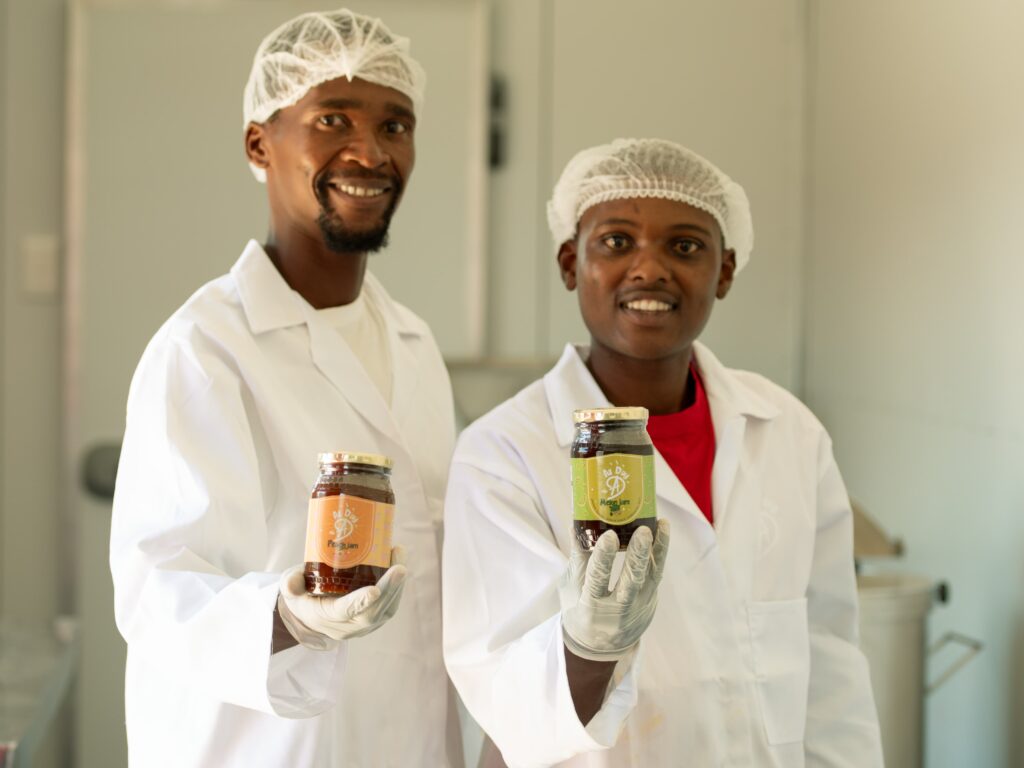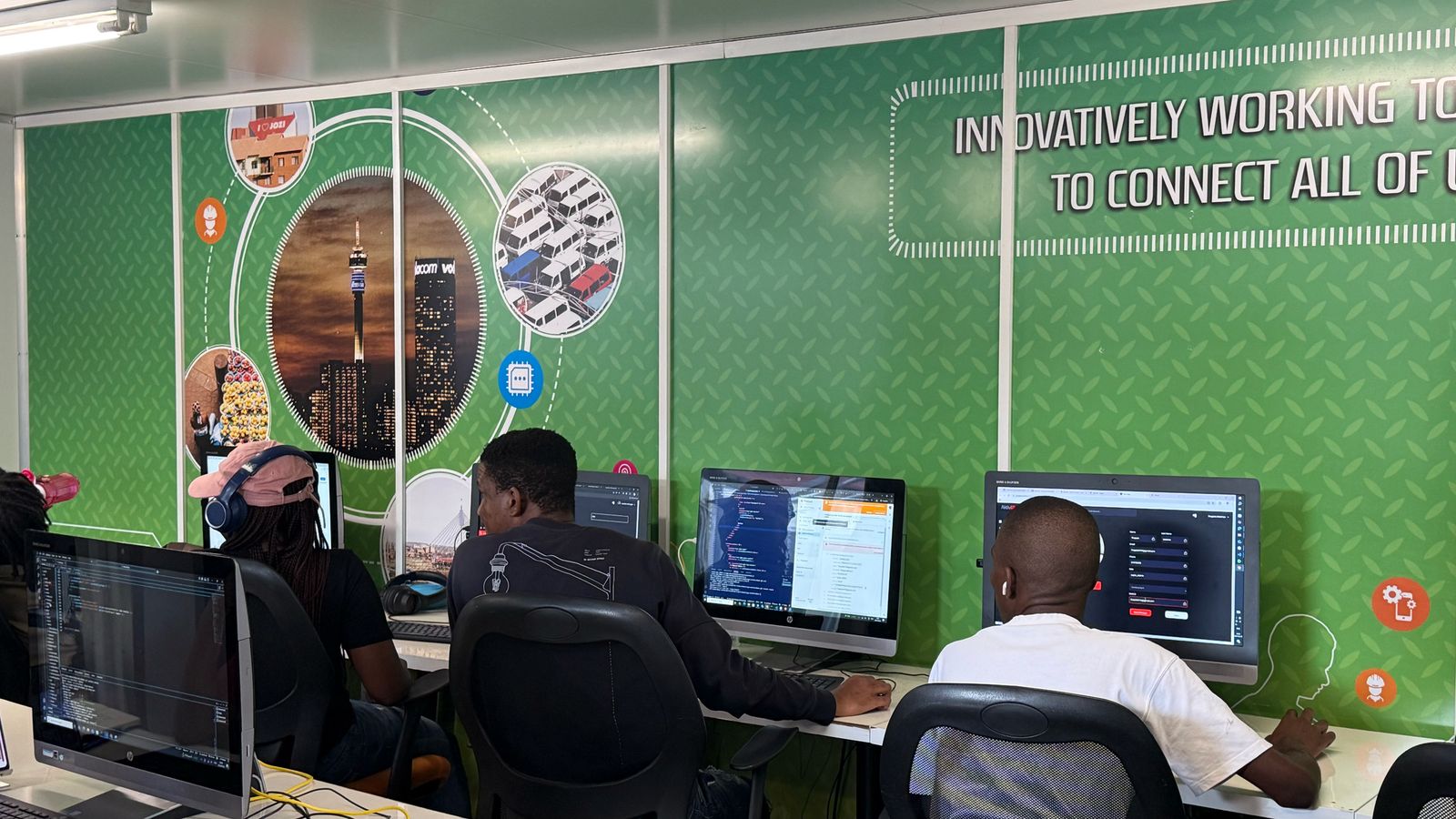The township economy in South Africa contributes almost 6% to the country’s GDP. At the epicenter of this growth are the innovation hubs, breaking the barriers for aspiring entrepreneurs and creating a new wave of economic transformation in historically underserved communities.
Located just 30km north of South Africa’s administrative capital Pretoria is Soshanguve, a township known for its vibrant Bacardi dance scene and Se Pitori (Pretorian Sotho) language. This township, nestled east of Mabopane, is also home to entrepreneur, Mapula Ramothwala, the founder of Kool Crew, a manufacturing company that produces personal hygiene products for young people, aged six to 18, to boost their self-confidence.
“I didn’t grow up wanting to be an entrepreneur,” Ramothwala shares with FORBES AFRICA. With a background in agriculture, she had hoped to work in her farm. With a BTech degree in Animal Science, she also figured she would work in government, at institutes such as the Department of Agriculture, Labour or Rural Development. But that didn’t happen, and she instead, developed an interest in entrepreneurship.

About 140m from Soshanguve lies Orange Farm, one of South Africa’s youngest townships. According to the City of Johannesburg, it is today the country’s biggest and most populous informal settlement. It is here that Gontse Selaocoe founded and built his business, All Day Jam, specializing in organic jam spreads.
“Township economies have vast potential for growth and development,” Selaocoe says. “But businesses in townships often face unique challenges, such as limited access to funding, markets, and resources.”
Loading...
Despite being over an hour apart, both Ramothwala and Selaocoe share a common thread: they both turned to The Innovation Hub’s eKasiLabs to help build their businesses.
Ramothwala first heard of The Innovation Hub when she was chosen to be part of a competition they were hosting. “I applied, pitched my business, and got selected. That’s how I joined the Cap Accelerator Program [Cosmetic Accelerator Program]. From there, I became one of the clients of The Innovation Hub. The support I received included mentorship as well as access to markets, marketing, and funding to help expand our businesses.”
She explains the rationale behind her company, Kool Crew: “Many kids today experience body odor at a very early age. Research has shown that most parents feel helpless because there aren’t many products specifically formulated for that age group, particularly children between six and eight years old.
“Active kids, especially those in sports, are more prone to sweating and need to follow a proper hygiene routine. That’s the problem Kool Crew aims to solve.”
Launched in 2019, the business was conceived with a deep understanding of local needs. “We started in our township because we identified a gap in our community and understood the need for such products.”
Selaocoe’s All Day Jam, founded the same year, focuses on agro-processing, offering organic jam spreads with a commitment to sustainability, food security, and job creation in his community.
“We were inspired to launch in the township because we saw an opportunity to transform a former dumping site into a thriving organic farm, providing healthy produce to our community and creating employment,” he says.
Both entrepreneurs embody a wave of township entrepreneurs who, despite the challenges they face, are dedicated to revitalizing their local economies. However, many like them also need support to scale their businesses. This is where centers like The Innovation Hub play a crucial role.

James Segooa, Acting Executive Manager for Township Economic Revitalization at The Innovation Hub, specializes in the development of small, medium and micro enterprises (SMME) and the innovation ecosystem in both the public and private sectors.
“I am passionate about SMME development and believe they can [be] or are the drivers of economic growth and the employment creators this country needs,” Segooa says. “From our observations and interactions with township entrepreneurs, the biggest challenge we’ve identified is a lack of business skills. This affects everything they do. We’re seeing many entrepreneurs who have never had the opportunity to be part of any entrepreneurship development program.”
According to an opinion piece by Luvuyo Mncanca on the University of Cape Town’s website, township businesses face similar challenges to those of South African SMMEs: lack of management skills, difficulties accessing finance and credit, limited market access, low government support, and lack of appropriate technology.
“The township economy’s contribution to the country’s GDP is extremely high,” says Bulelani Balabala, founder of the Township Entrepreneurs Alliance (TEA). “But the challenge then is that the mainstream or formal markets still consider it as informal, as mass market.”
A report by Lesaka Technologies emphasizes how the informal market is fueling growth, noting that the township economy is valued at approximately R900 billion (about $49.4 billion).
At the heart of the township economy is its people–engaged in buying, selling, producing, consuming, and creating, within the township and beyond it.
GG Alcock, author of KasiNomics, told FORBES AFRICA last year that the contributions of the township economies could be a lot more–with the right numbers stymied by a lack of data. He estimated that over R45 billion ($2.4 billion) comes from spaza shop rentals and the backyard rental market alone.
Despite these challenges, the South African government is taking steps to empower small businesses.
“Micro, small, and medium enterprises and cooperatives together form a vital part of our economy with immense growth potential,” said South African President, Cyril Ramaphosa, in an address at the Presidential Micro, Small and Medium Enterprises and Cooperatives Awards in 2024. “Whether they are small businesses in townships or cooperatives in rural areas, whether they are well-established or just starting, these businesses are integral to the future of our economy.”
This is, perhaps, where incubators and accelerators such as The Innovation Hub comes in.
“We learned about The Innovation Hub through a local business network,” says Selaocoe, who went through the incubation process at the Sebokeng eKasiLab. “The hub provided us with valuable support, including business mentorship, training, and access to funding opportunities. Their incubation program helped us refine our business model, improve our operations, and scale our production.”
The hub forms part of the Gauteng Growth and Development Agency (GGDA) established by the provincial government to promote the economic development, innovation and competitiveness of South Africa’s Gauteng province.
“Our program offers business skills training at various centers,” Segooa explains. “We’re currently operational in 14 townships across Gauteng. I believe we’re one of the largest enterprise development programs within the township space, with 14 active centers.”
Segooa adds that aspiring entrepreneurs come to the hub with an idea or an already established product.
“They haven’t thought about pricing or a business model. We’re not even at the stage of talking about funding yet. In their minds, they know they need money, but they don’t know where to start to access it. And if you ask them, ‘do you need funding?’ they’ll say yes. But if you follow up with, ‘what do you need it for?’ that’s where the problem starts—because they haven’t thought that far ahead.”
Ramothwala adds that the biggest challenge for her was gaining market visibility and accessing the market.
“Through the mentorship we received, we gained valuable knowledge on how to build brand awareness. The mentors also advised us on compliance and how to properly run our business, which played a significant role in getting the business to where it is today.”
In February, in his State of the Nation address, President Ramaphosa stated that a transformation fund worth R20 billion ($1.09 billion) a year would be set up over the next five years to fund black-owned and small business enterprises.
“We are expanding our support for small and medium enterprises and for the informal economy, which sustains millions of jobs and livelihoods across our country,” he added.
While this funding is needed, Segooa emphasizes that skills need to be prioritized.
The Innovation Hub currently supports over 272 companies, with Segooa noting that in just 15 of the companies using the eKasi Lab program, 188 jobs have been created.
“I’ve witnessed real growth,” he says, laughing.
As a passionate advocate of township entrepreneurship, Balabala notes that innovation hubs play a critical role from multiple perspectives, thus reducing failure rates and accelerating business growth.
“For me, they become critical because entrepreneurship is solely predicated by the speed at which you fail. If you can learn fast and fail fast, then it means that you can position your business much quicker and iterate what your business model needs to be, and then go to market.”
“The township economy is indeed overlooked, and holds immense potential as a driver of social and economic development,” Ramothwala says.
“[What we are doing as township entrepreneurs] is building a foundation for inclusive growth, as in job creation. By investing in townships, the barriers of access to goods and services are lowered for residents, and we empower communities and give them incredible motivation tailored specifically for their community needs.”
She adds: “When an entrepreneur starts to realize that there is a gap and a need in the community, we also become an inspiration to many.”
“Be open to learning and adapting, and don’t be afraid to ask for help. Most importantly, believe in yourself and your business, and stay committed to your vision,” Selaocoe concludes.
Loading...
